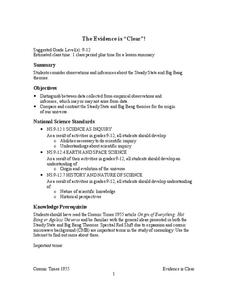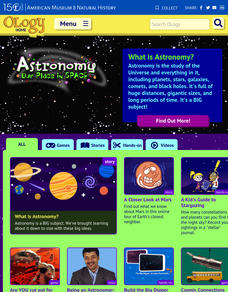Curated OER
Understanding the Cosmic Microwave Background (CMB)
How did our universe really begin? Explore the Science Big Bang Theory and Cosmic Microwave Background (CMB) with this multiple activity-based lesson that demonstrates that the increase of density due to the decrease of temperatures,...
NASA
The Evidence is “Clear”!
Do you think you know better? Become a scientist and prove it. Scholars review the evidence for two different theories of the origins of the universe. They notice the empirical observations as well as the inferences to determine which is...
Harvard University
Cosmic Questions
Scholars learn the stories of the universe with a unit study on the cosmos. They model the universe, learn about the relationship with the electromagnetic spectrum, understand the big bang theory, and debate the existence of life on...
Space Awareness
History of the Universe
Your pupils may believe that you and their parents are the oldest things in the universe, but surprise! There are elements of the universe that are even older. Elementary scientists create a class timeline to demonstrate the expansive...
Curated OER
New Gun Control Politics: A Whimper, Not a Bang
Using an article from The New York Times, learners answer discussion questions about gun control. They are divided into four groups to research different standpoints on gun control, including the Executive Office, Congress, Gun Control...
It's About Time
The Doppler Effect
In 1842, Christian Doppler proposed a theory relating the change of wavelengths based on motion. Young scholars observe the Doppler Effect on a small scale in a ball, on a larger scale from a car, and on the largest scale studying the...
Core Knowledge Foundation
Astronomy—Our Solar System and Beyond Tell It Again!™ Read-Aloud Anthology
A read-aloud anthology explores our solar system and beyond. Informational texts about astronomy invite pupils to discuss readings. Extension activities examine vocabulary, sayings, and phrases. Scholars work through the writing process...
media.yurisnight.net
Science Lesson Plan: Our Solar System: I Wonder?
Ever wonder why Pluto isn't considered a planet? Or how large the Earth is compared to the other inner planets? Explore the universe with a series of projects that simulate different aspects of our solar system. The activities require...
NASA
Measuring Dark Energy
You're only 10 minutes late? Do you know how much the universe has expanded in those 10 minutes? Scholars graph supernovae based on their redshift and see if the results verify Hubble's Law. If it does confirm it, the universe is...
Princeton University
A Teacher's Guide to the Universe
Astronomers only observe four percent of the universe as the rest hides in darkness. The size, shape, and movement of the universe are the focus for an long-term high school unit. Its 43 lessons include hands-on experiments, direct...
Science 4 Inquiry
Expanding the Universe
When Einstein first heard the theory of the expanding universe, he dismissed it as bad physics. Now scholars learn about the theory and how scientists prove it has merit. Through a hands-on simulation and videos, class members measure...
American Museum of Natural History
Planetary Mysteries
A website all about planetary mysteries—it's a one-stop-shop for all things, stars, planets, and space travel. Scholars read an astronomy overview to discover the page's big ideas, then choose from the plethora of resources, including...
Other popular searches
- The Big Bang Theory
- Space Big Bang Theory
- Scientific Big Bang Theory
- Science Big Bang Theory
- Space: Big Bang Theory
- Big Bang Theory Experiments
- Geography Big Bang Theory
- Space\: Big Bang Theory
- Space\\: Big Bang Theory













